Jim Andris, Facebook
The First Walk for Charity in St. Louis, Missouri, Sunday, April 20, 1980 and first Celebration of Lesbian and Gay Pride, April 12-20, 1980
Credit for organizing the first gay pride parade—held in New York City on Sunday, June 28, 1970—is usually is given to Craig Rodwell, founder of the Oscar Wilde Memorial Bookshop. On that same weekend there were marches in Los Angeles, San Francisco and Chicago. St. Louis, however, did not manage to organize a similar demonstration until nearly a decade later, and when it was finally put in place, and quite successfully, at that, it was called not a gay pride march but a Walk for Charity, held on Sunday, April 20, 1980. In fact, St. Louis organized not only a successful public demonstration, but also a whole week of activities sponsored by various supporting community organizations: the first St. Louis Celebration of Lesbian and Gay Pride of this size to be held in public and with the official sanction of the City of St. Louis. However, pride activities in St. Louis and in other Missouri cities had been held for a number of years during the 1970s in the context of various concerns and organizations.
The Roots of the April, 1980 Pride Celebration in St. Louis
When did pride activities actually begin in St. Louis? The Celebration of Lesbian and Gay Pride that was held during the week of April 12-20, 1980 in St. Louis, Missouri emerged from a decade of growing pride and awareness. To be sure, the Walk for Charity and Rally conceived, constructed and carried out by the Magnolia Committee, were the first activities to have the official sanction of the St. Louis Police Department and Mayor's Office. More than that, a Celebration Committee was put in place, the one from which the current Pride Committee traces its lineage. Nevertheless, pieces of the week long 1980 pride celebration resembled or had been fashioned from pride activities in previous years.
Especially in the 1970s, but even before then, St. Louis has had a rich and caring community presence in the form of gay and lesbian bars, local social networks of friends, a fabulous drag community, designated public meeting places in parks, at recognized landmarks, motorcycle clubs, and bath houses. To map out and appreciate this enormously complicated social network is perhaps beyond the scope of any research endeavor, let alone this one. But—and this is an important caveat—the roots of pride were always present and growing within this structure, and the stories of many unsung heroes and heroines will hopefully someday be found by the right librettists and composers.
A brief-lived political and social group called the Mandrake and patterned after the Mattachine Society was formed earlier in 1969. They intervened when a group of cross-dressing men were arrested on Halloween, 1969 during a police bar raid. "Mandrake members went down to the police station and worked for their release, obtained the following morning." The group faded out of existence in the early 1970s.
More specifically to Pride activities as we now understand them, there are anecdotal accounts of pride marches of considerable size in the early 1970s. One account reports that in 1971, Chuck Charleston, a bartender at the Red Bull in East St. Louis organized several cars full of demonstrators with signs in cars that drove over the Eads Bridge and down Market Street to Forest Park where "hundreds of people" gathered around the cannon. Another account by Jimmy Hawkins, owner of the Red Bull, maintains that all the bars got together and marched down Washington Avenue with a police escort. It seems likely that these accounts are rooted in some actual events that need to be better documented to be taken as fact.
Among the first places that area Pride blossomed in the early 1970s was on local college campuses. The Gay Liberation Front formed on the Washington University Campus in the fall of 1970. It organized consciousness-raising groups and worked for other organizations. Soon it moved off campus and first operated a coffee house and later met at Trinity Episcopal Church. The group splintered and folded before the end of 1971.
Probably the most politically influential lesbian organization in St. Louis in the 1970s was the Lesbian Alliance. Through their newsletter, Moonstorm, they certainly were a factor in the 1980 Celebration of Lesbian and Gay Pride. The collective may have formed as early as 1971, and the newsletter started in 1973 and continued periodically throughout the rest of the 1970s.
To take an example from another area academic organization, the Students for Gay Liberation at Southern Illinois University at Edwardsville held a remarkably diverse series of activities in Gay Awareness Week April 29-May 3, 1974. In addition to attracting the nationally recognized figures Franklin Kameny and Barbara Gittings, the Washington University Lesbian Alliance, MCC's Carol Cureton, and two SIUE professors, Hugh Barlow and Pat Murrell, were represented there.
Also, the gay rights movement of the early 1970s was very focused on eliminating irrational social restrictions on gays in the medical profession, broadly understood to include helping professions such as psychiatry, clinical psychology and social work. To begin with, these professions were rather frequent choices for gays and lesbians on career paths, though many of these individuals hid their sexual orientation to their professional colleagues and instructors. A nation-wide campaign to declassify homosexuality as a mental illness bore fruit, so to speak, with the American Psychiatric Association declassifying in 1973 and the American Psychological Association following suit in 1975. One should not underestimate the impact that this had on the pride and self image of gay and lesbian helping professionals, and their subsequent ability to educate their colleagues and help their clients more effectively. A very good example of this can be found by reading social worker Larry Davis' keynote address for the Sunday, April 20 Rally that concluded the 1980 Celebration of Lesbian and Gay Pride in St. Louis.
It was in 1973 that Rev. Carol Cureton came to St. Louis to found the St. Louis congregation of the Metropolitan Community Church. Various speakers and pride activities were sponsored by the Metropolitan Community Church under the leadership of Carol Cureton during the years 1973 to 1978 and by MCC's secular spawn, the Metropolitan Life Services Center, founded by Galen Moon and others. Rodney Wilson has documented several of these activities. Most notably, on June 9, 1977—two days after Dade County's sexual orientation protection ordinance was defeated in a ballot initiative led by Save Our Children—"MCC hosted St. Louis' Second Annual Gay Pride Rally. Several national and local leaders in the community spoke to over three hundred people assembled, including Troy Perry, founder of MCC." What is also interesting about this fact is that apparently there was a "First Annual Gay Pride Rally" in 1976.
Another aspect of developing pride both nationally and in the St. Louis area during the 1970s was the fact than lesbians and gay men in several religions denominations founded their own organizations. Pride in St. Louis in the middle to late 1970s in particular was growing in Dignity (Catholic), Integrity (Episcopalian), Affirmation (Methodist), and Lutherans Concerned. Of particular note is the St. Louis chapter of Dignity. One aspect of pride activities in the 1970s was day-long or two day-long series of speakers and workshop sessions on various topics. The St. Louis Chapter of Dignity was quite active in the middle 1970s, sponsoring a day of workshops and speakers by national and local Dignity leaders both in 1975 and in 1976. Dignity, too, often had meetings approaching 100 attendees, and was seen as a viable social alternative to the often noisy, smoky and seductive bar scene of the time.
The Save Our Children movement, led by Anita Bryant, mobilized the gay community and brought together many of its disparate elements as never before. The coalition that grew up in this 1977-1978 period had a very different composition than our current community. The inclusion of transgendered and intersex people in our community had not yet occurred. There was a women's community at Washington University due to the continued work from 1970 on by Professor Joyce Trebilcot and her colleagues. Women's alternative culture was alive and stong at this university, and included lesbian feminists and women who had gathered around passing the ERA. There was the impressive work of Metropolitan Community Church and the Metropolitan (later Midcontinent) Life Services Center. There were stronger connections of the St. Louis community to other Missouri gay networks, ones in Kansas City, Columbia, Joplin, and in Chicago. And even then, there were straight supporters of full civil rights for gays, who saw the Save Our Children campaign for the Stone Age bigotry that it was, for example, Carl T. Rowan who wrote this Washington Post article.
Ironically, during the same time period, a legal drama was playing out in Columbia Missouri, where on June 8, 1977 the U. S. Court of Appeals, Eighth Circuit decided that the University of Missouri must recognize the student group Gay Lib as a legitimate group and allow them to meet on university grounds. The U. S. Supreme Court refused to hear an appeal to this case on Feb. 21, 1978, which lead to a pride march of sorts in Columbia, Missouri on that day, and then a weekend of pride activities Sept. 29-Oct. 1. This weekend was certainly some kind of template for pride activities to come.
One pride celebration that is arguably essential for what happened in 1980 in St. Louis is the weekend of pride activities sponsored by Washington University in 1979. The materials from the conference/symposium demonstrate a high level of collaboration and coordination between various gay and lesbian organizations, Dignity, Integrity, Gay Academic Union, MCC, The Women's Eye (a bookstore), and others. The weekend included films, a dance, a concert, and displays.
1979 was also the first year that St. Louis women celebrated Take Back the Night here. Events that celebrate women's pride intersect with GLTB pride, and the moreso for lesbians." Probably the largest attended feminist event here in recent years was the June 9th WTBN march and rally. 1200 women gathered in Forest Park, marched through the park and the West End and got a lot of media attention." According to Nan Sweet, lesbians organized this event.
The National March on Washington for Lesbian and Gay Rights occurred just a month before the Magnolia Committee started organizing in November. Jim Thomas was a regional organizer for that event. It is unknown how many gay and lesbian St. Louisans attended this event, but it did inspire many who did, including Bill Spicer. There is little doubt that this event, and these participants in that event dramatically shaped and influenced the 1980 Celebration of Lesbian and Gay Pride in St. Louis.
Looking at all these events of the 1970s, it becomes clear not only what a debt did the Celebration of Lesbian and Gay Pride in 1980 owe to them, but also just how much did that event extend pride celebrations in St. Louis.
Events Leading up to the Celebration
Glenda Dilley and the Magnolia committee
The Magnolia Committee held its organizational meeting on Nov. 20, 1979 in Glenda Dilley's apartment on Magnolia Street. "I had the biggest apartment in the building, but it was in the basement," she laughed. Cea Hearth was born Glenda Dilley, but changed her name when she moved to San Francisco in the early days of the AIDS crisis. Glenda Dilley was president of the Columbia, Missouri organization, Gay Lib when on Feb. 21, 1978, the U.S. Supreme Court upheld a lower court decision that the University of Missouri was required by the First Amendment to allow Gay Lib to meet on University property. As a result of this decision, a Gay Pride Weekend was held at the University of Missouri Columbia on Sept. 29-30, Oct. 1, 1978. Glenda received a masters degree in education in 1979 from UM Columbia, and moved to St. Louis to start her professional life. However, she continued to pursue her activist interests there, using the pseudonym Adrienne Rae for public demonstrations and actions during the 1979-1980 period.
In an Aug. 10, 2010 interview with Jim Andris, Cea Hearth explained about the rationale for selecting members for the Magnolia Committee. The Committee was comprised of "emissaries from all of the other gay groups in town, … plus some few people from [minority] organizations other than gay." According to Cea, the funds raised were shared among all the organizations, gay and non-gay so that the Walk for Charity would be seen as "more a part of the outer society," "not too threatening," and "more inclusive." Calling the demonstration a "walk" rather than a "march" was also seen as less threatening. According to Cea Hearth (Adrienne Rae/Glenda Dilley):
"we gathered funds from all of those different gay bars. We put a little jar up, and I suppose they gathered funds in some of the community organizations as well, and we just, whatever had to be done, we would figure out who could do it, and how it should be done, and someone had to go to the mayor’s office, I remember, and so we needed some people who were able to use their real names and were able and willing to do that, and I don’t remember who the noble souls were now who did do that, but we had got everything we needed to have and just went forward with it. And April 20, we chose that date, partly because it was Earth Day, partly because it was—y’know, my birthday was the next day, April 21—just cause we thought we would."
As it turns out, there were yet other reasons for the choice of the April 20th date.
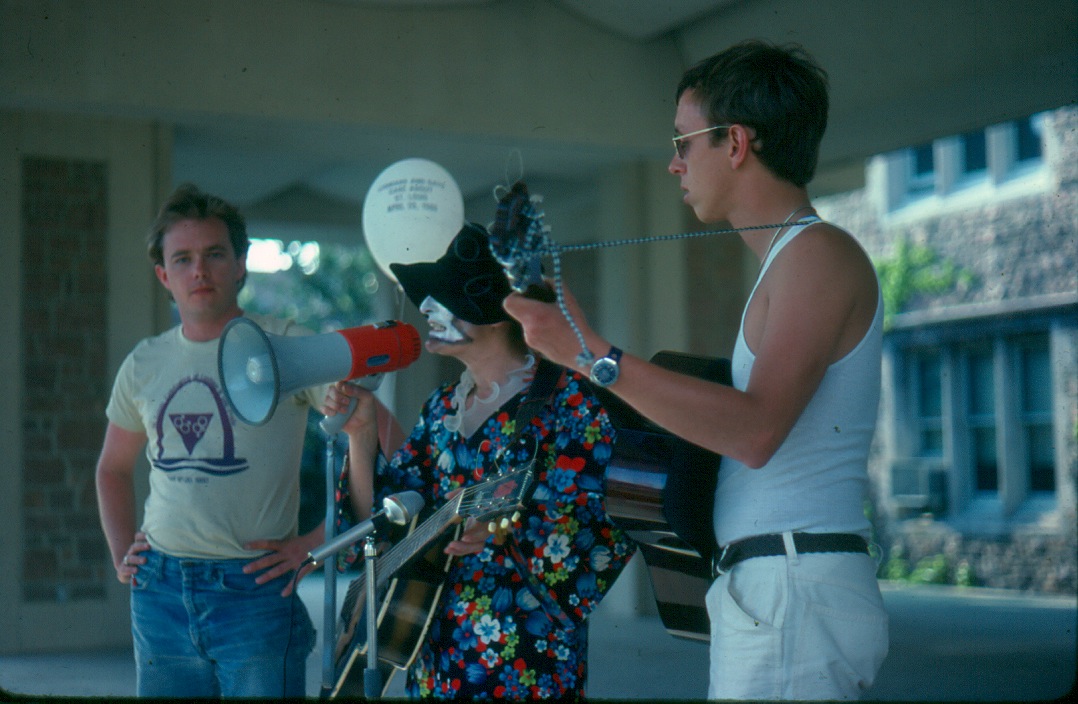 |
| At the Rally. Bill Trotter, left, Glenda Dilley as Adrienne Rae, center. © Jim Pfaff, 1980. |
Jim Thomas and the Saint Louis Organizing Committee
In 2003 Lisa Kohn interviewed Jim Thomas extensively about the events leading up to the 1980 St. Louis Celebration of Gay and Lesbian Pride. Jim had graduated from Oberlin in 1979 and moved to St. Louis later that year when a possible job connection in NYC fell through. Jim had a supportive community at Oberlin, and set about to build a similar situation for himself in St. Louis. While he was still at Oberin, Jim had first become a regional organizer for the National March on Washington for Lesbian and Gay Rights which occurred on Oct. 14, 1979 and would found the successful newspaper, The [Lesbian and] Gay News Telegraph in 1981. The St. Louis Organizing Committee was formed early in 1979 as part of the process of organizing the Midwest for attending the National March on Washington. After that highly motivating event, SLOC members worked together, with Jim in a leadership role, to bring about a similar Pride event in June of 1980 in St. Louis.
However, Jim grew up in the St. Louis area in Alton, Illinois, and even though he went away to Oberlin College in 1975, he used his summer vacations to explore and connect with the St. Louis gay community. He was particularly active in the summer of 1977, during the first national heat of the gay-demonizing Save our Children campaign led by Anita Bryant. He aligned himself with the then successfully active Metropolitan Life Services Center, and was even featured as one of the interviewees in a St. Louis Post Dispatch article. When Jim began to renew connections to St. Louis gay community at the end of his college studies, he explored two religious organizations Metropolitan Community Church and Dignity, a Catholic group, but ended up aligning himself temporarily with the Gay Academic Union (GAU) in St. Louis. He decided that a pride celebration in St. Louis would be a good idea, and began organizing a group for that purpose.
"the original conception was that the committee would be representatives from whatever groups wanted to participate. And so for instance, one of those groups was the National Organization for Women, as well as, I think by that time we probably had an Integrity chapter, which is the Episcopalians, although I don't know that for sure. Anyway, the idea was representatives from the individual organizations plus whatever individuals were interested. They would be an organizing committee that would handle overall PR for whatever happened, would organize an opening event for the week, and then a closing event, probably a march and rally. The original idea was to do this in June. There was a real conscious strategy that in the middle of those two events, those bookend events, the individual organizations would each do their individual activity. So the idea was to try to create a situation in which they would try to begin to work together but didn't have to give up their identity in order to do it. They could still preserve their own individual identity, and so it wasn't quite so threatening to get involved. [boldface added by author]"
However, just as the organization of the continuation of SLOC (to be IRIS) got underway, Jim discovered that the Magnolia Committee, discussed above, already existed. He found that committee's focus to be the organization of a walk for charity in February, while his group's emphasis was on a week's activity in June, no doubt influenced by his knowledge of pride celebrations on the coasts and in Chicago. According to the No Bad News, June, 1980 issue:
"at the suggestion of MCC pastor Roy Birchard, an open meeting of 35-40 people was held January 27 to discuss how to accommodate both activities. After discussion, it was decided to combine the events into one celebration. Magnolia members pushed for an early date so as to include area college and university students, although others in the meeting wanted a later date to allow for better planning and coordination. A compromise date in late April was accepted."
The Celebration Committee was the result, and Jim Thomas became the chair of that committee. The combined effort would be for both a week's activity by various sponsors and a walk for charity and rally as the culminating event. Jim was a self-aware advocate and catalyst for bringing the broader community together:
My goal in those early years was always about community building, and that’s why the key aspect of the Celebration Committee was that it was bringing together the groups for a larger [cause]. That’s exactly what took me to doing the newspaper, because once a year community building wasn’t enough, and so I wanted to do something, a place where people could talk about themselves, and share ideas year round, and that was the genesis of the newspaper. It was a really logical line from doing the celebration to the newspaper, because my thinking was all the same.
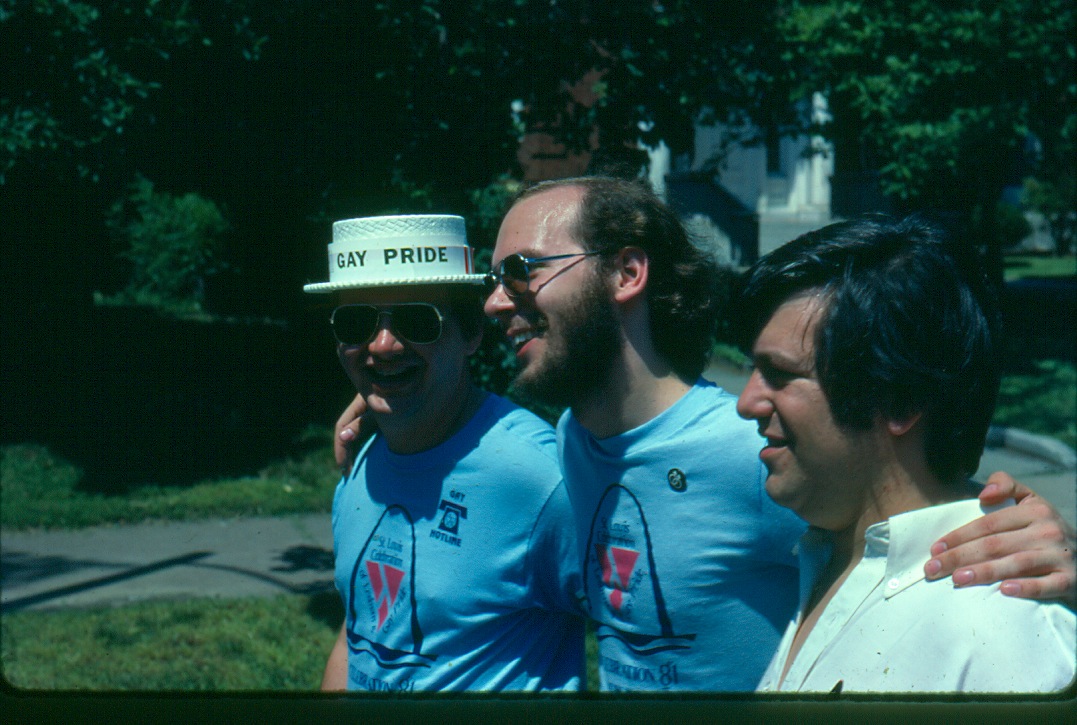 |
| Pride March, 1981. Bill Cordes, Jim Thomas, Dan Simonovsky. © Jim Pfaff, 1981 |
Chris Guerrero and the Concerned Lesbian and Gay Students of Washington University
In another article, Gay Pride Weekend Hosted by the Concerned Gay Students (CGS) at Washington University, I have argued that Chris Guerrero and the Concerned Lesbian and Gay Students of Washington University were prime forces in helping to create the Celebration of Lesbian and Gay Pride that occurred in 1980. Here is a brief outline of the facts from that article. Chris Guerrero held the position of Women's Programming Coordinator from 1977 until 1982. During that time period she planned or supported a simply amazing number of women's and gay events. While her name isn't on the documents, I believe that she fully supported the development of the Gay Pride Weekend at Washington University that was hosted by CGS April 20-22, 1979. This event appears to be a template for about a third of the 1980 activities, and anyone doubting this should examine the primary documents that are on this website under the 1979 section. The weekend contained workshops, a film, a woman's concert by Chris Williamson, a dance, a board meeting of the Missouri Coalition for Human Rights (led by Rick Garcia), and an ecumenical religious service on Sunday. As to whether the event was a true community event, I quote the Thanks section of the professionally printed program:
… to Student Union Programming Boards for the funding which made this weekend possible; to the Office of Student Activities for their unfailing help and guidance, and to the Feminist Coalition and the Women's Resource Center for the use of their space and their support.
… to Affirmation, Cordiss Printing, Dignity, Gay Academic Union, Gaylife, Integrity, KWUR, Left Bank Books, Lutherans Concerned, Metropolitan Community Church, Shared Visions, Sunshine Inn, and The Women's Eye. Let's hear it for community involvement!!!
… to Shaun, Beth, Bruce, Sarah, Bill, Val, Ken, Cindy, David, Holly, Darrell, Linda, Jim, Chris, Steve, Claire, Marvin, Sue, Wayne, Cary, Alan, Rita, Scott, Chris, Joe, Jane, Barry, Marian, Art, Barb, Jim, Jane, Byron, Kris, John, Susan, Jack, Lily, Hank, Lucia, Ray, Diana, Terry, Bev and you!
… and a special thanks to Deb, Ira and Alex for without their many, many long hours of work, this celebration would never have been anything more than a dream we all had. once upon a time.
It is more than an interesting coincidence that the weekend agreed upon for the 1980 Walk for Charity and Rally corresponded exactly with the weekend on which the 1979 Gay Pride Celebration presented by Washington University's Concerned Lesbian and Gay Students. Chris Guerrero was a central figure on the Magnolia Committee, and she was one of the four people to meet with Mayor Conway's office, along with Bill Spicer, Bill Trotter and John Hilgeman. Guerrero was also the Publicity person on the Celebration Committee in 1980. Jim Thomas remembers the negotiations in the Celebration Committee between those supporting a date in late June and those arguing for an earlier date. [Note: Magnolia Committee documents show that that earlier date was actually Palm Sunday, which was March 30.]
I think what won us over was the argument that particularly with a new activity with this, even considering that there had been stuff happened at Wash U previously, it was still a new event, and it felt new as we were doing it, um, moving it off campus, kind of doing it in a new way, as well as even if you consider that the Wash U event as in its lineage, if you will, it’s only the second year of doing something, and a big piece of the argument was that we needed those Wash U students, both in terms of organizing and participation, and not just Wash U, but any other college students, but it was primarily Wash U centered, ‘cause that’s where the activity was in terms of student activism. And so that was a major factor in settling on that April date that first year, was that we needed student participation, both in organizing and attendance.
I wonder if it was Chris Guerrero who was holding out for the April 20, 1980 date for the Walk for Charity and Rally?
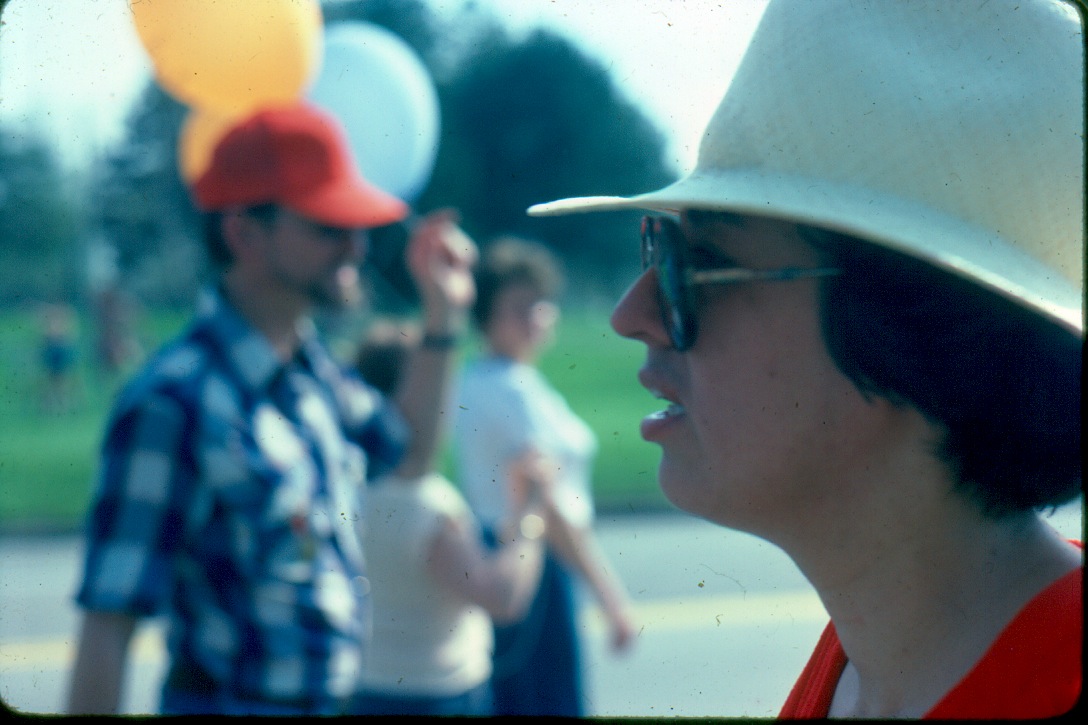 |
| Walk for Charity, Lindell Ave. Frank Sprayberry, Chris Guerrero. © Jim Pfaff, 1980. |
Bill Spicer and Community Involvement
No one worked harder on community involvement than Bill Spicer. Bill was one of the people who participated in the National March on Washington and was transformed by it. He joined the Magnolia Committee in January of 1980 as a Dignity representative, but rapidly became Glenda Dilley's right hand man. If Glenda had brought seasoned activist experience, vision and commitment to the Magnoia Committee, Bill brought a fearless determination to do what it took to get things done, and a willingess to go public. He became Secretary for the Magnolia Committee. It is Spicer's name that is on the parade permit. It is also clear from a letter from an April 4, 1980 letter from St. Louis Mayor, James Conway to Mr. William Spicer, Secretary, Magnolia Committee that Spicer was a central figure in establishing a productive working relationship between the lesbian and gay community and various City of St. Louis departments, including the Police Department, the Dept. of Streets (parade permit obtained Feb. 21), and the mayor's office itself. Bill Spicer is also identified as "a spokesman for the organizers of the march" in a piece by Geof Hobson, Staff writer for the St. Louis Post-Dispatch titled "Fear, Pride in Step in Gay March Here." He is the only person mentioned or quoted in the article to be identified by his full name.
Whether it was making posters, going around to ALL the bars in the St. Louis metro area, designing coupons for the pride celebration, you name it, Bill Spicer threw his heart and soul into it. But in one area, he and another Magnolian, Bill Trotter, did yeomans' service. Spicer set out to make the entire bar community aware of and involved in the up and coming festivities in April:
We went to all the bars in town, and at that time, I remember the, there was a bar that was, ah, I guess, Martin’s was a bar, there was also a bar called the Bijou, there was Herbie’s, there was a number of bars that were … I think there was a couple in Soulard. We would call the bar, we would talk to the bartender, and we would ask to talk to the owner, then we would leave our name and number, and we’d leave the can there, and then we’d ask them to call us back, and then we’d ask them if we could put up a poster in the window. … It was highly structured, and we tried really hard to get a lot of, and we tried to get the bartender to come and walk with us, and say, well, can you show up at the event, and do you know any of your patrons who will come to the walk, and yeah, we went to all the bars, and we gave ‘em all posters, and we all distributed these donation cans.
Bill Spicer preserved an inch-thick folder of materials from his work with the Magnolia Committee that has been an invaluable source in reconstructing these past events. Many of the images of the St. Louis Celebration of Lesbian and Gay Pride 1980 that the St. Louis LGBT History Project has collected came from this folder. For example, a small poster which may have appeared below one of the jars that was placed in various gay and lesbian related sites, mainly bars, lists other organizations to benefit from the proceeds from the Walk for Charity: Abused Womens Support Project, Gay Academic Union Hotline, Womens Self Help Center, Matrix, Inc., Ad Hoc Committee to Save Homer G. Phillips, Life Crisis Services Inc., and Karen House and Cass House of the Catholic Worker Community. A total of $1200 was raised.
The comedic drag trio, Sex Inc. gave a very successful benefit at Martin's VIP lounge in March for the Celebration Committee's activities, raising another $1000. No doubt along with the rest of the bar community, it was the work of the Magnolia Committee that raised their awareness of the need.
Another invaluable document found in the Magnolia Folder was a letter crafted by an augmented Magnolia Committee on Valentine's Day, 1980. It gives so much insight into the successful integration of then Glenda Dilley's Magnolia Committee and Jim Thomas' budding Pride Committee, that it has been transcribed and is available on this website. This letter is also important because it reveals the participation of still more groups in the expanded and coordinated planning for the 1980 St. Louis pride activities. Integrity and Affirmation were then existing groups for gay and lesbian Episcopalians and Methodists, respectively. Brothers for Change was a group that may have contained some gay men and may have hosted communication between gay and straight men, as well as discussion of and action on other rights issues of the time. The Women's Eye was a lesbian/feminist bookstore. The St. Louis Organizing Committee, in which Jim Thomas had been involved, had been formed before the March on Washington and continued into the 1980 pride activities. Two other gay organizations that participated in some aspects of the celebration are Lutherans Concerned and Black and White Men Together.
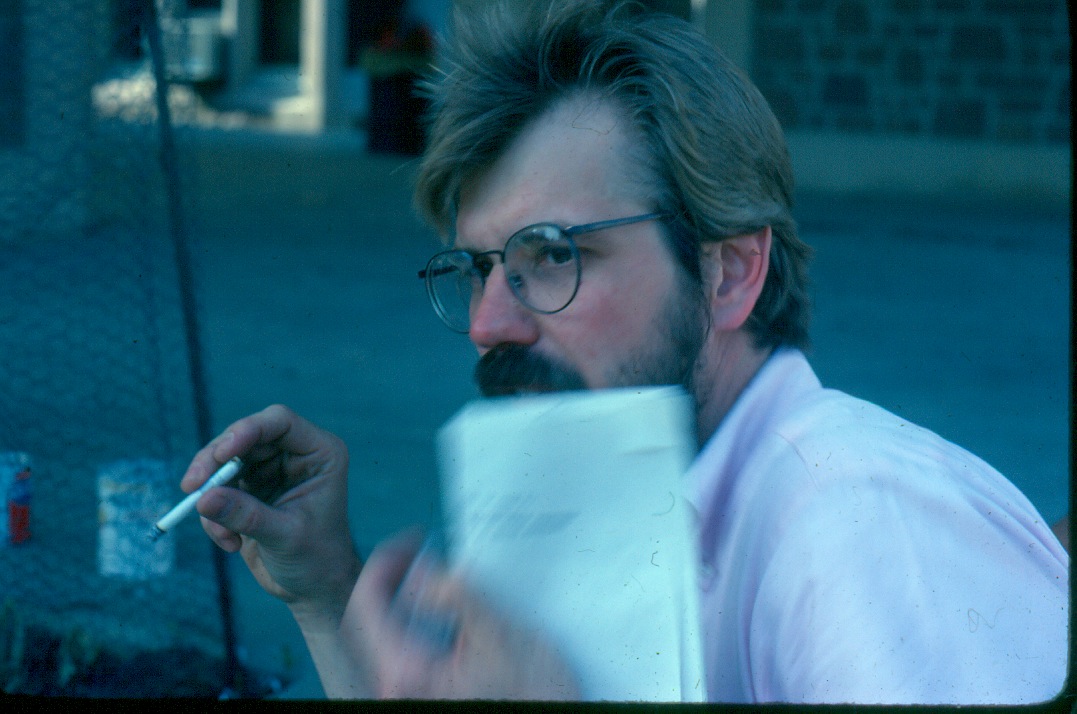 |
| Waiting to introduce Rally speakers. Bill Spicer. © Jim Pfaff, 1980. |
Leaders in the Religious and Secular Organizations
If someone wanted to leash to some task the organized St. Louis gay and lesbian community at the end of the 1970s, they would have had to reach out to the bar community, campus student organizations, and the various religious and secular gay organizations of the time. Of particular import were the religious organizations: Metropolitan Community Church, Dignity, Integrity, Affirmation and Lutherans Concerned. Taken together, they may have had as many as 1000 active members. Each one of these organizations would have a handful of individuals in a leadership position, or perhaps one or two, who were willing to speak for their organization.
Such a person was Frank Sprayberry. Perhaps he could be dubbed Glenda Dilley's left-hand man, but he also brought years of experience in civil-rights causes to the table, and particularly, experience in working with the Episcopal Church. The chapter of Integrity that had been formed at Trinity Episcopal Church in 1977 was rather conservative, but Frank worked with the Trinity group, Dean Micheal Allen of Christ Church Cathedral and his own parish, St. John's Episcopal Church, to elicit Episcopalian support for the Walk for Charity. Frank's presence on the Vestry at St. John's helped in forming an alliance with straight parishioners and the then Rector, Bud Ball. The Magnolia Committee used St. John's Episcopal Church at 3664 Arsenal Street as a mailing address for correspondence between it and the City of St. Louis. A March 21, 1980 letter to Hon. James Conway, Mayor of St. Louis from the Magnolia Committee shows just how carefully thought out was this first demonstration of pride. It was by no means an uncontrolled, spontaneous display, but rather the result of months of careful planning, compromise, negotiation, and thoughtful consideration. In effect, it masterfully combines the request for rights and respect for the lesbian and gay community with a campaign to establish the community as caring and constructive. I have transcribed the letter here.
It has already been noted that Bill Spicer was a Dignity representative to the Magnolia Committee, and there were other Dignity leaders who were committed and involved. Dignity carried a banner in the 1980 celebrtion. Rev. Roy Birchard, pastor of Metropolitan Community Church at the time, has told me that while some individual members of MCC walked on April 20, there was not an MCC contingent carrying a banner at the first public march. Roy was there in a straw hat. The Metropolitan Community Church had become less of a political force in St. Louis after the Carol Cureton years of 1973-1978.
Too, there was a dedicated core of community leaders who pursued political and service goals as their primary interest, though some of these may have had this or that religious affiliation too. Galen Moon had worked through most of the 1970s to create a gay community center and a gay hotline, and he was not alone in this focus. The Midcontinent Life Services Center lasted from late 1975 until the fall of 1978. Many things came from the work of Galen and his colleagues during this period including a Hotline, publications (Prime Time, Gay St. Louis), and the center itself. The names of many of these workers are found in these old publications. However, though the center folded, that coalition of interested gay civil rights and community workers did not, and that coalition was around and cooperatively working during the period leading up to the first Celebration of Lesbian and Gay Pride in 1980. They had a particular interest in funding and maintaining a well- and competently-staffed Hotline. The Gay Hotline of the time was to be one of the recipients of the proceeds of the fundraising.
Frequently, individuals wore many hats, i.e. were active in more than one group of the time. One such individual was Wayne Huber, a talented visual artist. He had many connections and many leadership roles. Wayne worked hard on the Gay Hotline; in fact he was one of three that continued on the Hotline Committee as Galen was preparing to leave town. Wayne was quite active in Lutherans Concerned, and also in Black and White Men Together. Another hard worker was Ray Lake. Ray was active in the St. Louis Leather community, but also worked tirelessly to maintain and effective Gay Hotline in St. Louis. Ray had in 1977 been appointed by Carol Cureton and national officer Adam DeBaugh as the local chair of the Christian Social Action Committee. For years Ray wore a variety of social, religious and secular hats. Many dedicated persons could be mentioned here, that did indeed participate in the loosely organized communication network of the community at the time. Bill Cordes actually helped to keep that network informed. Young and new to the community in the late 70s, he picked up publishing the newsletter that had been started by the Midcontinent Life Services Center. Lisa Wagaman, a transgendered male to female lesbian, was active from the early part of the 1970s, and was sure to show up at almost any important community-wide meeting and volunteer to do whatever it took.
| Other LGBT leaders from Early Pride Celebrations. | |
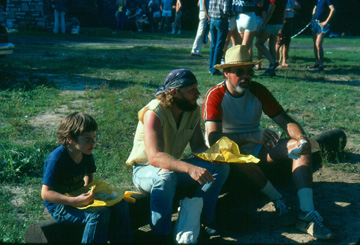 |
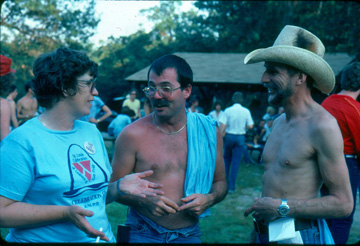 |
| Bob Hansman, center, Wayne Huber, right. From 1981 Pride. |
Left to right, Helen Schneider, Dave Willis, Ray Lake. From 1981 Pride. |
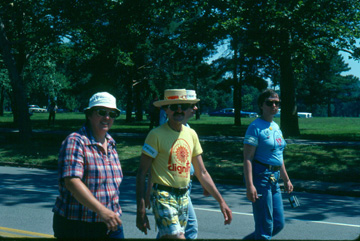 |
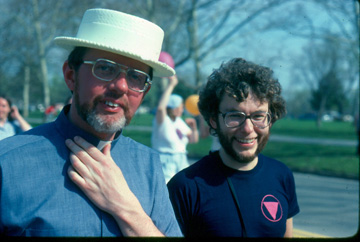 |
| Left to right, Sister Tobias, Larry Donnelly, Jack van Dillen and Lisa Wagaman. From 1981 Pride. | Left, Rev. Roy Birchard, right, Jim Breeden. From 1980 Pride. |
| All images © Jim Pfaff. | |
This was the part of the community that I connected with during the early months of 1980. Ray, Wayne, Bill, Lisa, Roy at first, and later Glenda, Frank, Bill. I was on the Board of Metropolitan Community Church and became president of the Gay Academic Union in 1980.
A Week of Celebration
The newspaper No Bad News in perhaps its first issue, June, 1980, gave very complete coverage of the April, 1980 Pride festivities. The article fills out and informs the following narrative.
A week of activities was eventually offered from April 12-20, 1980 and culminated in the Walk for Charity and Rally at the Washington University Quadrangle. Studying the Schedule of Events for this St. Louis Celebration of Gay and Lesbian Pride yields information about some of the groups that were involved. The Concerned Lesbian and Gay Students (CLGS) (of Washington University) sponsored a dance in the Holmes Lounge on Saturday, April 12. 150 were in attendance.
Club St. Louis (a member of the Club Baths Chain), with support from The Bowery, and Potpourri, sponsored an afternoon picnic near Steinberg Rink in Forest Park on Sunday, April 13. 250 people were estimated to have attended this hamburger and hot dog barbecue despite the cold weather. Jim Thomas remembers the picnic vividly:
"The week began in a very worrisome fashion. We had a picnic in Forest Park, which started out well enough, and then the temperature really began to drop, and I do remember nobody wanted to leave. We were all hanging out around the fires where we were cooking things. That came to an end, and that night we had seven inches of snow. But you know, it was April and that all melted away very quickly. The rest of the week went fine." [Three pictures of this event are in the No Bad News article.]
Midweek, on the evening of April 16, the Women's Group (of Washington University) presented two free films at the Gargoyle: "Daughter Rite" and "In the Best Interest of the Children to approximately 100 people. Thursday, April 17, saw three groups cooperate to present a potluck dinner and performance at the Metropolitan Community Church building at 5108 Waterman. The other two participating groups for the dinner and performance were Iris and The Celebration Committee. According to No Bad News "extra tables were needed to accomodate the 90 people who came to enjoy the food and an extensive after-dinner theatrical reading by three members of Lutherans Concerned [B.F. added]."
On Friday The Women's Eye bookstore at 3644 Rosbury held an open house attended by 50 women, while CLGS also sponsored the film "A Very Natural Thing" on Friday evening to a standing-room-only, 200 person crowd, April 20 in Rebstock auditorium.
Apparently two committees split responsibilites for a full weekend of activities. The Celebration Committee sponsored a day of workshops on Saturday, April 19 at Forest Park Community College on a range of topics. Jim Thomas remembered that even though there had been workshops the previous year at the Washington University Gay Pride Weekend, it was thought that the Wash U group had enought to do, and involving St. Louis Community College—Forest Park would be a way of increasing the base of community involvement.
The Magnolia Committee sponsored a carefully planned afternoon Lesbians, Gays and Friends Walk for Charity from Maryland Plaza down Lindell Blvd. to Washington University and a Rally at the Washington University Quadrangle. The finale of a packed week of activities was the COLOR FOR THE 80'S BALL at Carnegie's at 704 Lafayette sponsored by Lesbian/Gay Organization for Acceptance and Liberation (LGOAL). No Bad News reported that the much anticipated Ball had to be moved to the Gateway Hotel due to the fact that the State Liquor Board blocked the event, informing Carnegie's that they did not have the proper permits just three days before the event. Spirits were apparently not dampened, despite suspicions of harrassment, and 200 people enjoyed the dinner/dance at the Gateway.
A first-hand account by Jim Andris of these Sunday events is available that captures a lot of the excitement and color of the original event, including teachers in clown outfits and a caliope. One of the things made clear by Andris' account is the participation of Parents of Gays, Dignity, Iris, MCC, The Socialist Workers Party, Moonstorm and Gay Academic Union in the walk for charity, and there were many others. Also mentioned in the account is the keynote speaker of the rally, Larry Davis, the fact that a representative of the mayor's office spoke, and that Byron Davidson gave inspiring comments. The mayor's representative was Ellen Dunning (now Ellen Sweets). Cea Hearth in her then public persona of Adrienne Rae, played guitar and sang gay liberation songs to the crowd. She was dressed in KISS style makeup, with a big black and white star on her face. Chris Guerrero, Jim Thomas and Bill Spicer introduced and thanked people.
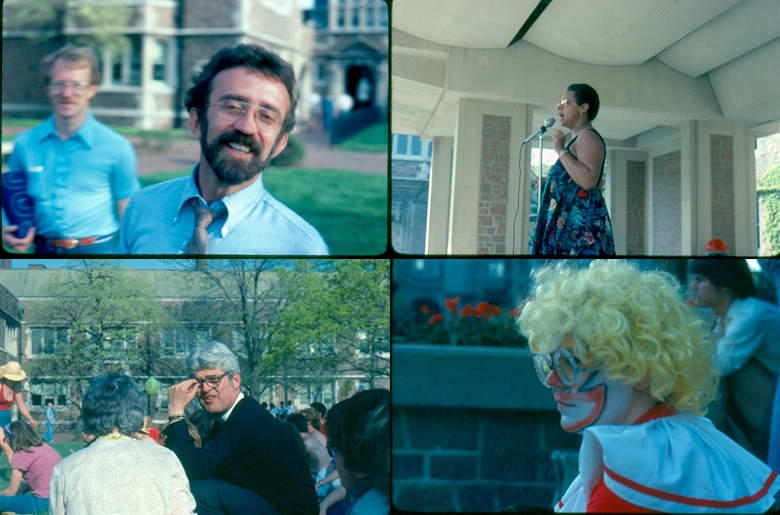 |
Rally images clockwise from upper left. 1) Larry Davis, left, keynote speaker, and his lover, Stephen. All images ©Jim Pfaff, 1980. |
The No Bad News account identifies the mayor's representative as Ellen Sweets, head of the local Civil Rights Enforcement Agency, and reports that a letter of commendation from Mayor James Conway was read. It also identifies Byron Davidson as the host of the KADI radio show "Gay Rap" [The actual name was "Gay Talk." ed.] and mentions that Dean Michael Allen of Christ Church Cathedral made remarks.
Eventually, Iris, the St. Louis Coalition for Lesbian and Gay Rights, would hold a first informational meeting of about 30 people on May 12, 1980 at the Metropolitan Community Church. The organization was to have three major goals of political growth, education and media advocacy. The organization did not last long, however, and broke up over gender disputes.
Reflection and Concluding Remarks
The No Bad News article contains several paragraphs of discussion on problems which emerged within the week. Some women were unhappy with both an apparent orientation towards the male and also the lack of support by men for some women's events. This is no small matter and needs to be studied, although that study is beyond the scope of this article. However, a few points are in order. The role of St. Louis and Missouri women in developing gay and lesbian pride activites is pronounced. Throughout the 1970s there was both strong cooperation between lesbians and straight or bisexual women, and disputes and arguments among them. Moreover, men, straight, bisexual and gay, came late, if at all, to an understanding or appreciation of these relationships.
Moonstorm was a women's collective with a strong record of activities and publication from nearly the start of the decade of the 1970s, and several other women's and lesbian organizations are a matter of record. To take just one example of how the study of these organizations and publications might be illuminating, issue #20, April, 1980 of Moonstorm contains two well thought out articles entitled "Lesbians—working with gay men?" and "Gay men—working with lesbians?" Here is a provocative statement from one of those articles:
"There are not many avenues for lesbians and gay men to work together in St. Louis. When Anita Bryant crossed Missouri, a gay coalition was begun that was comprised of almost all lesbians and a few gay men. This recent coalition for Gay Pride Week is primarily men, with a few gay women. Our biggest dividing line seems to be that gay men like to be around and deal with men and lesbians like to socialize with and deal with women."
And finally, no understanding of the growth of pride activities in St. Louis would even be halfway complete without a thorough understanding of the bar scene in decades earlier than the 1980s. GLTB people were so oppressed in earlier times that they had to create their own space to begin to develop their sense of pride and even right to self-respecting existence. Before the churches and denominational groups, the activist organizations, the political interest groups, there were the bars. Bars were our homes away from home, and sometimes, our only homes, before there were other alternatives. Whole histories could be written on women's bars, leather bars, the drag community, the baths, and the tearooms. To look even a bit askance at these developing venues instead of seeing each one of them as a crucible for emerging pride would be to fail to understand and appreciate the birth of the GLTB perspective in St. Louis. And let's not forget the opera queens either. Lalala.
References
Andris, Jim, "Even Alexander the Great," No Bad News. July, 1980.
Andris, Jim, Interview of Cea Hearth, August 10, 2010.
Andris, Jim, "Main article on the 1978 Columbia, Mo. Pride Celebration," online http://www.siue.edu/~jandris/history/h78.1.html
"Celebration of Lesbian, Gay Pride Is Successful Community-Builder." No Bad News, June, 1980, pp. 1, 8, 9.
Conway, Mayor James, Papers. University Archives, Department of Special Collections, Washington University.
Darnell, Ian, "Re: Oral History Project," email to Steve Brawley, cc: Colin Murphy forwarded to Jim Andris, Sept. 26, 2011, topic, early gay pride demonstrations in St. Louis.
Hobson, "Fear, Pride in Step in Gay March Here." St. Louis Post-Dispatch. [Somewhere near April 20, 1980.]
Homosexuality and Psychology, Wikipedia article.
Kohn, Lisa, Interview of Jim Thomas, Dec. 1, 2003.
Moonstorm, Issue 20, April 1980. 12 pp.
St. Louis Gay History Project, online, Steve Brawley, webmaster, http://www.stlouisgayhistory.com
Thomas, Jim, "St. Louis Activist Group for Lesbian, Gay Rights Founded ." No Bad News, June, 1980, pp. 1.
Wilson, Rodney C. "The Seed Time of Gay Rights: Rev. Carol Cureton, the Metropolitan Community Church and Gay St. Louis, 1969-1980." Gateway Heritage, Fall 1994, pp. 34-47.